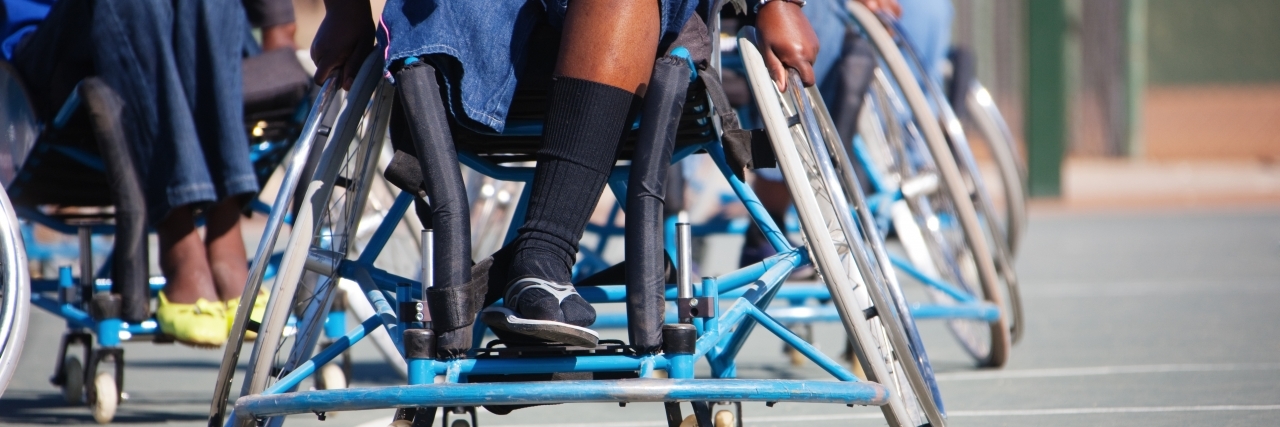I’m a “lucky cripple.” I’m pretty, I can walk short distances on flat terrain and go up a flight of stairs with help. I received a huge amount of therapy and education growing up, thanks largely to the tireless effort of my parents. I can wear fashionable clothes, go out at a moment’s notice, and use the bathroom by myself. Most of my friends forget I’m disabled.
But I’m not a Paralympic Athlete, that shiny new form of disability that is almost enviable. They have spreads in fashion magazines, transfer onto couches to chat with talk show hosts, and get to open supermarkets. It’s seen as a great point of progress in our society that we are finally including disabled people in public, recognizing that some people need different things in order to be successful. So long as they “pass.”
By “passing,” I mean society views it as more OK to be disabled now, as long as you’re not “too disabled.” As long as you are inspirational / good looking / don’t need too much to fit into the rest of our lives, the world at least pays lip service to the idea that disabled people should have their basic human rights protected. But if you drool, if you don’t look good on camera, if we need to put in a lot of work and make a lot of changes to help you, then your needs can be negated.
Recently there’s been a double standard in what it means to be disabled. Increased acceptance is only available to some, so long as you fit into what society’s standards of with a person with a disability should be like. The rest of us are labeled benefit scroungers, invalids, burdens, or worse.
This has become very clear to me over the past seven months, which is how long I’ve been without my wheelchair. Last October I was on my way to interview a NASA scientist for my series when I was denied carriage on a British Airways flight out of London City Airport. When the staff returned my wheelchair, the chair’s computer was so badly damaged it was no longer safe to drive. When I asked for help, I was told by a British Airway representative that the situation “can’t be that bad.”
British Airways will fly the entire GB Paralympic Team to the Rio Games this year.
The problem is the corporation uses the fact that they sponsor Team GB as proof that they treat all people with disabilities well. Never mind that they’ve refused flights to people simply because they had Down syndrome, or that the US Department of Transportation fined the company last month for their treatment of passengers with disabilities. Never mind their guide dog tax for people who need to fly with assistance dogs, which no other airline has, or all the other people who have made contact with me over the past seven months who have also had their wheelchairs broken by British Airways.
Paralympic athletes are lucky in the same way I am lucky. A combination of what our disability left and what it took away us makes up who we are. If my cerebral palsy affected me cognitively, I probably wouldn’t be on a flight to interview a guy who works with NASA. I have the ability to write well, have my voice heard, and be noticed. These are skills I have honed from gifts I already had. But that doesn’t mean I deserve more human rights than someone who has other difficulties. There’s a word for parties who offer one set of standards to disabled people who manage to “pass” and then turn around and assume those who don’t are “benefit scroungers.” They’re called hypocrites.
Progress for one is not necessarily progress for all. For years I thought it was. I was wrong. Seeing a company give great service to Paralympic athletes and use it as proof that they treat people with disabilities well, while refusing to take responsibility for breaking my wheelchair, has taught me otherwise. It’s not how you treat the “lucky ones” that matters. It’s how you treat the most vulnerable, the most complicated, the scariest, when no one else is looking that determines your character.
A double standard towards people with disabilities isn’t progress. It is more prejudice, dressed up as advancement, something to be proud of, a public relations trick and political agendas. Nobody is served by double standards. Those of us who “pass” are whisked into an illusion where we falsely believe that the world is changing. Those of us who don’t “pass” continue to be held down by no fault of our own.
True change is slow and can only be measured through consistency and not double standards.
The Mighty is asking the following: Describe a moment where you experienced intolerance or inaccessibility. What needs to happen to change this? Check out our Submit a Story page for more about our submission guidelines.

